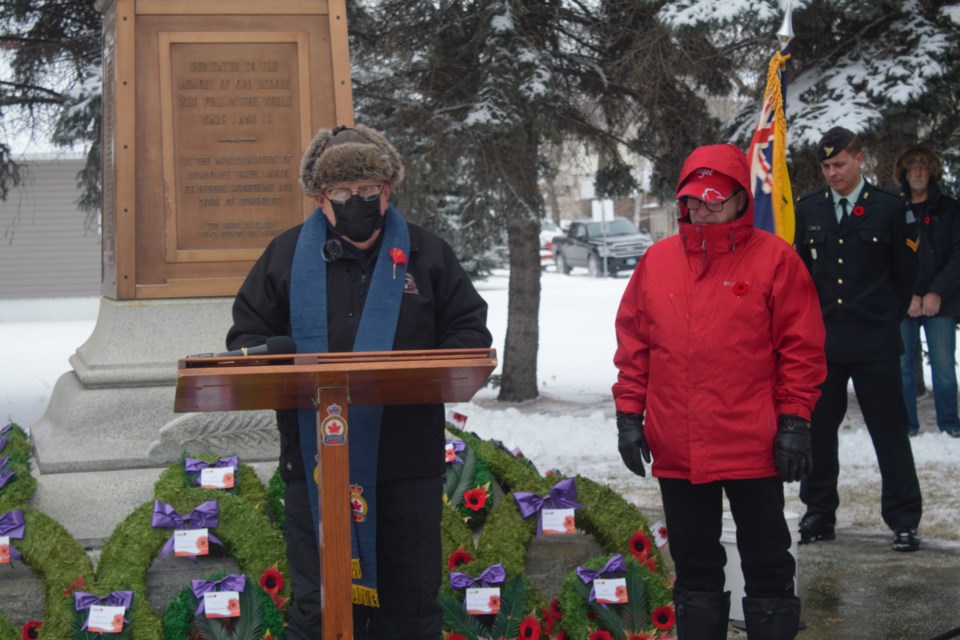HUMBOLDT — Rev. Al Hingley, who led the Humboldt Remembrance Day service, said the message he would like the community to take away is Mayor Michael Behiel’s message about remembering.
“It is said that we must never become complacent in what is still a dangerous world,” Behiel said. “That is why each year we gather to remember the sacrifices and the horrors that so many made and continue to make in the name of freedom and justice for all of us, and yet as time passes and new generations come forth the true horrors of the past are often forgotten.”
Behiel encouraged attendees to take the time to learn and educate these younger generations on the efforts that were made and continue to be made.
“’Lest we forget’ is a saying that must ring deep in our souls and never lose its true meaning.”
The ceremony began just minutes before the moment of silence at 11 a.m. with a singing of the national anthem. After the moment of silence, Hingley began a prayer, before moving into a reading from John 15:9-17. After another prayer, this one for peace, Hingley reflected on the history of the poppy and read In Flanders Fields, with the Legion celebrating its 100 year anniversary with the poppy campaign in Canada.
Another anniversary Hingley focused on was the 80 years since the Battle of Hong Kong, which lasted the month of December in 1941. During the battle Canadians suffered over 1,000 deaths and over 200 wounded.
After Hingley’s speech, Donald Hogemann, president of the Humboldt Royal Canadian Legion Branch #28, spoke, giving greetings from the Legion and thanked those who contributed to making the ceremony happen. Hogemann acknowledged Fr. Joseph Ackerman, a local Second World War veteran who passed away in September at the age of 97, after which the Muenster Elks placed a wreath symbolizing the annual placement honouring the fallen.
According to the Royal Canadian Legion, the significance of the poppy can be traced back to the Napoleonic Wars in the 19th century, over 110 years before being adopted in Canada.
Records from that time indicate how thick poppies grew over the graves of soldiers in the area of Flanders, France. Fields that had been barren before battle exploded with the blood-red flowers after the fighting ended.
The idea for the Remembrance Poppy was conceived by French humanitarian Madame Anna Guérin, inspired by Lt-Col. John McCrae’s poem, In Flanders Fields from the First World War. Guérin had originally founded a charity to help rebuild regions of France torn apart by the war, and created poppies made of fabric to raise funds.
Following this, she presented her concept to France’s allies, including the precursor to The Royal Canadian Legion, The Great War Veterans Association for consideration, which they adopted in 1921.
“Today the poppy is worn each year during the remembrance period to honour our fallen, but the Legion also encourages the wearing of a poppy during the funeral of a veteran and for any commemorative event honouring fallen soldiers,” Hingley said. “It is not inappropriate to wear a poppy during other times to commemorate fallen veterans.”
In an interview with the Humboldt Journal, Hingley said that by not remembering, especially in a time of crisis, history is doomed to repeat.
“How do you remember if you haven’t experienced something? You remember through the experience of others as the examples every day in front of us.”

.png;w=120;h=80;mode=crop)


